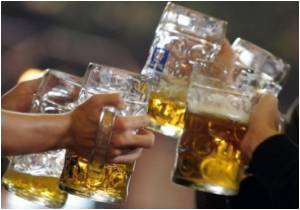New study confirms that in China binge drinking has reached epidemic proportions and argues for the need to tackle the country's unique drinking culture.

So among Chinese people who drink, the average man regularly drinks to just below binge level and has a true binge about once every two months. The average woman drinks to excessive levels (above 15g per day) and binges about once every 5 months.
What makes China unique among other heavy drinking countries is that drinking frequency, quantity, and binge drinking increase with age. The heaviest Chinese drinkers are middle-aged or beyond, while drinking levels in other countries tend to peak in people's late teens and early twenties.
There is a cultural basis for this difference: Chinese youths are expected to concentrate on education and avoid alcohol, while older people are encouraged to drink during social occasions to enhance friendships and build relationships with business partners. Entrenched drinking customs in China also contribute to the problem, such as frequent dining out, drinking with business partners, toasting (urging one another to drink), and popular drinking games such as 'Wager' that encourage excessive drinking.
China's drinking problem is not helped by the overwhelming popularity of spirits over wine. Spirits have much longer history in China than wine and are more accessible, especially in rural areas or undeveloped regions.
The lead author of this study, Yichong Li, says that if the China wants to curb its national drinking levels it must develop culturally specific interventions. "The Chinese mass media, especially the mainstream media, is awash with ads for alcoholic beverages. And there are no regulations for access to alcoholic beverages, so people of any age can buy alcohol. Frequent moderate drinkers in China are very likely to be binge drinkers, because they are often urged to drink at special occasions, and may need more alcohol than usual to reach a higher mood. Given these characteristics, the most effective interventions for China would be to limit alcohol commercials, increase alcohol taxes, restrict availability and, most importantly, change Chinese people's entrenched attitudes toward drinking by persistently informing current and future generations about healthy drinking habits."
Advertisement
Source-Eurekalert










